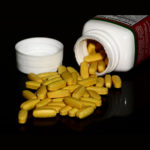By Ben Fuchs | Pharmacist Ben
 One of my favorite vitamins is cyanocobalamin. I am particularly fond of this nutrient, which is better known as Vitamin B-12 (it’s actually a member B-12 family of vitamins) for 2 reasons. First of all it’s the only purple vitamin. That’s because each molecule of B-12 contains atomic cobalt which contributes its violet color.
One of my favorite vitamins is cyanocobalamin. I am particularly fond of this nutrient, which is better known as Vitamin B-12 (it’s actually a member B-12 family of vitamins) for 2 reasons. First of all it’s the only purple vitamin. That’s because each molecule of B-12 contains atomic cobalt which contributes its violet color.
Secondly, Vitamin B-12 packs an enormous punch. Even in the nanogram quantities this completely non-toxic nutrient is required in, Vitamin B-12 supports a wide range of biological functions involving the nervous system and has been uses for decades in intravenous form as an energizing nutrient and anti-depressant. It also plays a critical role in the health of blood cells and the circulatory system.
Vitamin B-12 deficiencies are common due to a lack of a protein called “intrinsic factor” (IF) which under normal conditions is secreted from the stomach. Elderly folks are especially prone to diminished IF and the ensuing B-12 deficiencies are one of the hallmark symptoms of old age. Vegetarians may also have a problem getting Vitamin B-12 as the only non-animal sources of this critical nutrient are nutritional yeast and fortified foods. While algaes contain Vitamin B-12, there is some controversy as to how much of it is available for human nutritional needs.
I recommend that everyone gets at least 500 mcg of oral B-12 daily. If you suspect malabsorbtion due to a shortage of IF you can use sublingual (under the tongue) or intranasal Vitamin B-12 preparations, which bypass the digestive system entirely and go right in the blood stream.












